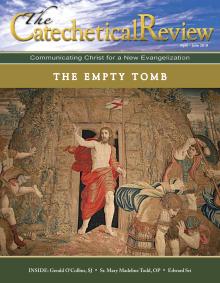“It would make no difference to my faith,” someone once assured me, “if they found the bones of Jesus.” He spoke only of his faith not being shaken and did not claim anything about the faith of others. About the same time, I received the results of a questionnaire on the resurrection presented to several hundred college students. Almost 90% agreed that they could not believe in the risen Jesus unless his tomb was found empty. They accepted the underlying argument of the graffito one sees on walls in the springtime: “There will be no Easter this year. They have found the body.”
What is the historical evidence that underpins accepting the empty tomb? And how does the empty tomb center Christian faith in Jesus risen from the dead?
Evidence of the Resurrection
The New Testament offers at least three strands of evidence that support the historicity of the empty tomb story: the testimony of Mark 16 (followed by Matthew 28 and Luke 24) that three women discovered Jesus’ tomb to be open and empty on the first Easter Sunday; the probably independent witness of John 20 that Mary Magdalene made that discovery (immediately confirmed by Peter and “the beloved disciple”); and the implications of Paul’s teaching in 1 Corinthians 15.
The rest of this online article is available for current Guild members.
This article is from The Catechetical Review (Online Edition ISSN 2379-6324) and may be copied for catechetical purposes only. It may not be reprinted in another published work without the permission of The Catechetical Review by contacting [email protected]

















